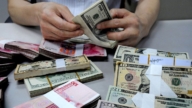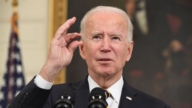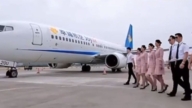【新唐人2012年8月25日讯】“汇丰银行”最新公布的资料显示,中国8月份“制造业采购经理指数”(PMI)在荣枯分水岭下方,降到9个月以来新的低点,显示中国制造业持续面临困境,而出口订单指数也创下09年以来新低,出口订单指标大幅恶化,市场对中国经济回暖信号的期待又一次落空。专家们认为,中国经济已经走入死胡同。
8月份汇丰中国“制造业采购经理指数”PMI指数跌到47.8,8月份新出口订单指数也降到44.7,低于7月份的46.7,创出2009年3月以来的最低水准。
金融信息服务公司Markit提供的新闻稿显示,中国大陆的新订单和新出口订单指数双双大幅度恶化,同时,产出分项指数降到五个月来新低,库存指数则大幅逆向上升,显示制造者经营压力增大。
资料提供商CapitalVue声称,整个8月份钢铁价格一直下跌,目前已接近2009年来的低位。反映出房地产、基础设施建设和制造业的钢铁需求疲软。
而中国的金融市场也在持续走软。上证综合指数上个月累计下跌2.6%。
美国“南卡罗来纳大学艾肯商学院”教授谢田:“中国经济,我认为全面进入停滞的状态,我们看到:不管从库存、工业生产者物价指数到进出口、其他零售、业绩指标全面进入了硬着陆的状态。”
北京《国情内参》期刊首席研究员巩胜利指出,中国经济已经走入死胡同。
北京《国情内参》首席研究员 巩胜利:“出口方面急剧下跌,这是第一方面,第二驾马车,改革开放以来,国内的消费一直都不正,第三驾马车,中国投资好像拉不动,中国经济面临的问题比较复杂,比美国比欧洲还要更复杂一些。”
在经济发展速度持续放缓的情况下,中共中央政府日前决定,简化对涉及实体经济、小微企业发展和民间投资的审批程序,并在南部广东省率先试行,以帮助刺激经济的发展。
大陆一些地方政府也相继推出所谓“大手笔”的投资计划,试图在2009年中央政府出台4万亿经济刺激计划之后,再次上演由地方政府为主角的,以投资刺激经济发展的新举措,不过这些投资还是着眼于基础设施建设。
谢田:“这种增长是低品质的、浪费型的、实际上是虚假的,有几万公里的高速公路没有汽车跑,好多机场没有航班,这种浪费的方法继续下去的话,除了增长通货膨胀的话,对人们生活没有什么好处。”
巩胜利说,08金融海啸后,中国计划经济的大幅度扩张,使中国的经济走上了一条不归路。
巩胜利:“计划经济在扩张,市场经济在收缩,就是中国经济自由的调节能力在减弱,比如市场经济国家来讲,他们基本上是让经济自己修复、自己调节,在中国,因为行政干预太多太多,所以经济一直处在一个最高的警戒水准。”
之前,中国央行曾在短短一个月内两度降息,发改委也加快部分专案审批进度,不过,中国今年二季度GDP(国内生产总值)同比增长7.6%,还在延续近两年的下行态势,是1992年以来增长回档时间最长的一次。
采访编辑/刘惠 后制/萧宇
August PMI Signifies Chinese Economy Reaching A Dead End
According to the latest information from “HSBC", the August
Manufacturing Purchasing Managers’ Index (PMI) has hit bottom and is down to a nine-month new low.
China’s manufacturing industry continues to face difficulties.
The export orders index also hit its lowest level since 2009,
a significant deterioration in export orders.
The expectations of the market to pick up were crushed.
Experts believe that China’s economy has reached a dead end.
In August, while HSBC’s PMI index fell to 47.8,
its new export orders index also dropped to 44.7,
down from 46.7 in July, reaching its lowest level
since March 2009.
The press release, provided by Markit,
a financial information services company, shows that
mainland China’s new orders and new export orders
both deteriorated substantially.
Meanwhile, the output sub-index dropped to a five-month low,
while the stock index rose sharply in a reverse manner and
displayed an increase operational pressure on manufacturers.
The data provider CapitalVue claimed that entire steel prices
have been falling in August, nearing the 2009 low.
It reflects a weak demand for steel from real estate,
infrastructure, construction, and manufacturing.
China’s financial markets have continued to weaken.
The Shanghai Composite Index fell 2.6% last month cumulatively.
Xie Tian, professor of University of South Carolina Aiken
Business School: “I think that China’s economy has entered completely into a state of stagnation.
From retail performance indicators to inventory, the industrial
producer price index to the import and export, all indicate a hard landing."
A principal researcher from National Conditions and Internal
Reference", Gong Shengli says that China’s economy has hit a dead end.
Gong Shengli:” Exports fell sharply, that is the first aspect.
Second, since the reform and opening up,
the domestic consumption has not been positive.
The third is that Chinese investment is stagnant.
The problems faced by the Chinese economy are more complex
than that in the United States or in Europe."
Under the continuous slow down of economic development,
the Chinese Central Committee has decided to simplify
the approval process relating to the real economy,
the development of small and micro enterprises,
and private investment.
The first trial will be in the southern Guangdong Province
to help stimulate economic development.
Many local governments have also launched the so-called
“big ticket" investment plan, new initiatives to stimulate economic development.
The local government will play a main role after the central
government introduced a 4 trillion economic stimulus plan in 2009.
However, these investments are still aimed at
the construction of infrastructure.
Xie Tian: “This growth is low quality, wasteful,
and in fact phony.
There are tens of thousands of kilometers of highways
without cars and airports without flights.
If such a waste continues, what good would it do for people’s
life besides more inflation.”
Gong Shengli said that after the financial tsunami,
a huge expansion of China’s planned economy has put its economy onto a path of no return.
Gong Shengli: “Planned economy is expanding,
but the free economy is shrinking.
That means the ability to regulate economic freedom
in China weakened.
In a market economy country,
they basically let the economy fix their own regulation.
However, administrative intervention in China is so much
that the economy has been at the highest alert level."
Previously, China’s central bank has cut interest rates twice
in just one month,
the NDRC also accelerated the progress of the project approval,
however, in the second quarter of this year,
China’s GDP (gross domestic product) grew by 7.6%,
and has still continued the downward trend for nearly two years.
It is the longest growth retreat since 1992.



























